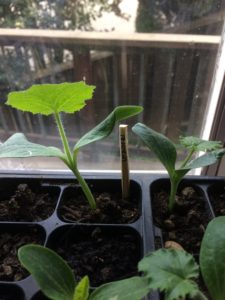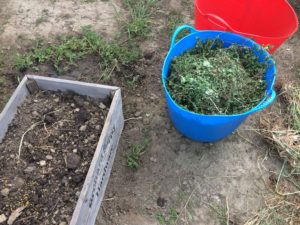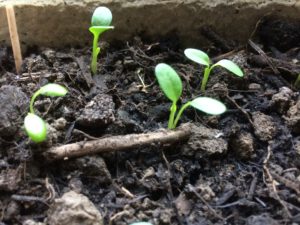
Squash seedlings almost ready for transplant!
Good morning, good morning. What’s the sun doing where you are right now? How is it feeding your heart?
Even though it’s possible, here in California, to garden year-round, I still live with the rhythms I learned growing up in zone 5 out in the midwest, where one had to take a break in gardening overwinter because, you know, snow. But every late February, something about the quality of light changes, and I get called back out into the garden. We moved last fall, so I have a new garden to build here. I’ve put in some carrot and radish seeds, have peas and chard and onions and herbs and nasturtium and sweet pea growing, and I can just barely see the tips of gai lan seedlings. It’s hard not to want to do it all right now, to have the garden bursting with color and fruit and flower that we left behind in Oakland. I’m re-learning the slow work of cultivation.
I had to dig out some kind of tenacious weed yesterday — California burclover, I discovered — and, while I dug my fingers around a particularly obstinate stem, I got to thinking about the work of uprooting rape culture.
The burclover, right now, is lovely, tender, with clover-like leaves and small yellow flowers. You can just barely see the buds of the fruit next to those flowers; the green pods are covered with a fine fringe that, when they get brown and dry, will turn into spines that dig into any bare feet or paws that go walking through the lawn. I know from past experience how difficult it is to get rid of these plants once they’re established in a garden, so I started pulling them out of this new yard as soon as I realized they were what was matting the area around my garden bed. But they don’t come up easy — though each plant just has one white taproot (like a dandelion) holding it in place, aboveground it sends out suckers and vines that also put down little roots in the soil as they spread. If you can get the whole rosette in hand and twist up, often you can pull up the taproot, too, but the sucker branches twist into those of other plants, growing over and under, through and around. Untangling those as best as possible, trying to save other small plants caught in between, becomes the slowest part of the weeding process.
I spent more than an hour on this yesterday, and still only managed to clean out a couple of square feet, barely noticeable if you’re not paying close attention. The ground I’m working with is clay-y and hardening — often, instead of getting the taproot out, I just tore off the surface greenery, leaving the slick greenbrown stems. I got out tools, used the hand cultivator and trowel, spent several minutes on each one of these plants, trying to dig out the root.
It was good and patient work, centering, calming.
While I was at this, I thought, This is what the struggle against rape is like — this is what it takes to end or change a cultural mindset that says that some people (mostly men) should get to have sexual access to the bodies of the people (mostly women and children) whenever they want. This mindset has deep roots, is well-established, can look harmless at first, in certain lights or seasons or when young or early in relationships, say, and gets twisted into and through the rest of society, choking the life from other things — both wild and cultivated — that need air and light and room to grow.

A bucketful of burweed
I can’t pull out one plant and be done with it. I have to try and get them all. But I can’t do it all at one time, nor can I do it all alone, as burweed certainly has a presence in every neighbor’s garden and in the wildlands back behind the house. I have to be vigilant, return to the same spots that I worked over yesterday to pull up the plants that I missed or whose roots kept hold. And during the time that I live here, I won’t eradicate all the California burclover. But I’m also choosing not to lean on the easy solution of poison, which will damage the soil I’m trying to reclaim and make it less hospitable for other life, will kill other plants also deemed weeds by a certain type of gardener and the gardening industrial complex, but that I want to nurture and save.
So I keep going in with my bare hands, now, when the fruits are still young — before they dry into hard burrs that are intended to dig into feet and feathers and fur, get carried away to establish new colonies elsewhere — and root out what I can.
The work of change is like this — slow, persistent, requiring patience and tenacity and vigilance. And with as many people as there are tangled up in the binds of rape culture, uprooting it is going to take time, as we try and help untangle the thoughts and beliefs and behaviors and entitlements and shames from the other stuff inside that needs room to breathe but has been choked of light and air — kindness, creativity, vulnerability, humility, grief, tenderness. The work is slow. It may take our combined lifetimes.
But I’ll tell you that yesterday, when I took a break, I noticed how good my body and mind felt, being at this labor, how grateful I was to be outside, my hands embedded with dirt, back sore, the work begun—incomplete, sure, but begun.

milkweed seedlings
My mother taught me the rhythm out of weeding, which, inadvertently taught me the rhythm of change work. She cleared out her huge garden a little bit every day, pulled a few weeds, tended the loosed soil, planted something new – until eventually she had the messy gorgeous beauty that is her sprawling wildflower-herb-vegetable garden. It’s a rhythm, a daily practice, something that can sustain us as we engage in the work of uprooting ideas and mindsets (of say, patriarchy and white supremacy) that have overtaken much more than their fair share of the earth, digging out space for more beauty, more birds and butterflies and bees, more sustenance, more space where it safe to walk on a spring morning in your bare feet.
Is there something in your life that needs some room to grow, to breathe? What would you be cultivating right now, if you gave yourself permission? Take 10 minutes with a notebook, open to a new page, and just write whatever comes when you think about these questions. Try not to edit or think too much about it, and follow your writing wherever it seems to want you to go. Be easy with you today, ok? And thank you for your good words.

One response to “uprooting and untangling the binds of rape culture”